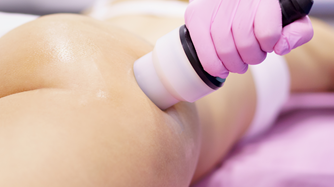Shockwave therapy in Denver can treat chronic tendonitis, plantar fasciitis, and Achilles tendonitis, among other conditions. These conditions mainly affect athletes but can also affect everyday people, especially those who lead active lifestyles and overexert their muscles. You may experience pain and discomfort when these injuries happen. Extracorporeal shockwave therapy (ESWT) can help.
Table of Contents
ToggleWhat is Shockwave Therapy, and How Does it Work?
Shockwave therapy is a non-invasive treatment used for several conditions. Despite its popularity in treating musculoskeletal injuries, it began as a treatment for kidney stones and gallstones (extracorporeal shock wave lithotripsy or ESWL). It has been a preferred treatment for these conditions for over twenty years.
Additionally, shockwave therapy in Denver has been used to treat musculoskeletal conditions, including tennis elbow and bony nonunion. Since their introduction, the Food and Drug Administration (FDA) has approved extracorporeal shockwave therapy machine devices to treat lateral epicondylitis and plantar fasciitis. You can purchase “shockwave” therapy devices for as little as $200 online. However, you get what you pay for. High-quality, medical-grade, professional devices begin at $30,000 and can cost as much as $100,000. Medical-grade shockwave therapy devices help patients avoid potential surgical procedures and steroid injections.
What Can Shockwave Therapy Treat?
Patients throughout Arvada, Denver, and Wheat Ridge, Colorado, are searching out shockwave therapy for many different reasons. But what exactly is shockwave therapy, and what can it treat? Here are three common conditions this innovative therapy can help with.
1. Shockwave Therapy for Plantar Fasciitis: Plantar fasciitis is often described as a “stabbing” pain in the heel. Shockwave therapy offers painless treatment and a real possibility for relief for people suffering from plantar fasciitis. This therapy stimulates the body’s natural healing process by delivering high-energy shockwaves to the inflamed Plantar Fascia ligament, reducing inflammation and facilitating healing. Our Denver patients have found lasting relief from their heel pain. We also encourage our patients to use simple, inexpensive orthotics to provide additional support for their feet. If you are searching for “shock wave treatment for plantar fasciitis near me,” you’ve found us! Click HERE to schedule your shockwave therapy for heel spurs and plantar fasciitis.
2. Shockwave Therapy for Tennis Elbow (Lateral Epicondylitis): Tennis elbow can be a persistent and painful problem for avid tennis players or anyone who performs repetitive arm movements. However, shockwave therapy is a painless and effective solution. By targeting the inflamed tissues with shockwaves, we can increase blood flow, accelerate tissue repair, relieve pain, and improve function. Shockwave therapy in Denver allows people with tennis elbow to return to their favorite activities with less pain and discomfort.
3. Shockwave Therapy for Knee Patellar Tendonitis: Patellar tendinitis occurs when the tendon connecting the patella (kneecap) to the shinbone becomes inflamed. The patellar tendon is vital as it enables the muscles in the thigh (Quadriceps) to the shin bone, allowing us to extend our knee. Patellar tendinitis (aka jumper’s knee) is common in many athletes, especially in basketball and volleyball. When this condition occurs in children, it can result in Osgood–Schlatter disease. This constant pressure can result in a painful bump below the knee that worsens with activity and is relieved with rest and ice.
4. Shockwave Therapy for Shin Splints: Shin splints are an “overuse” injury that results in frequent, dull pain along the “shin” bone (tibia) and the tibialis anterior muscle in the lower leg. Shin splints occur more often in people who don’t exercise regularly or when their exercise workload is increased. In severe cases, shin pain will occur when performing simple tasks like walking up stairs.
5. Shockwave Therapy for Scar Tissue: Scar tissue often results in pain, stiffness, and decreased mobility. Shockwave therapy relieves these symptoms by breaking up the scar tissue and promoting healthy tissue growth. Pain and stiffness are reduced, and the range of motion is improved when scar tissue diminishes,
How Does Shockwave Therapy in Denver Work?
Shockwave therapy accelerates the body’s normal healing process. It speeds up the recovery of injured joints and tissue while diminishing pain and discomfort. Extracorporeal shockwave therapy works in one of two ways: through “focused” shockwaves or “radial” pressure waves. A medical provider will administer the treatment, although lasting benefits may require several visits.
The focused shockwave method uses a very focused impulse to target affected areas. Since the shockwave used is low-energy, there is no need for anesthesia. During treatment, the patient lies down with the affected area exposed. The doctor applies a special gel to the affected area, which helps deliver the impulses deeper into the skin.
The ESTW device applies shockwaves to the treatment area through rapid “pulses’. Shockwave therapy treatments typically last between 5 and 15 minutes. While this treatment can be uncomfortable for some patients, most notice only light pressure and no pain.
The first ESWT device to hit the market was the electrohydraulic device, followed by the piezoelectric device and several electromagnetic machines. These devices have the same outcome: releasing focused pressure pulses to injured joints and tissue. It is equally important to note that the main differences between these devices are the focus zones and sound fields. Despite these differences, each of these devices generates shockwaves to promote healing. However, the pressure and shock waves vary in energy and focus.
Shockwave Therapy Combined with Other Treatments Provides the Best Results
Extensive research on using shockwave therapy to break up scar tissue has shown it is effective for many conditions. Additionally, there is strong evidence of its success in treating Achilles tendinopathy and relieving the symptoms. Shockwave therapy has expanded its treatment areas over the years. While research is ongoing, medical professionals hope shockwave therapies can help treat neurological disorders like multiple sclerosis and the effects of stroke. Most patients will experience significant improvement in their conditions with three weeks of consistent treatment. Of course, our doctors will determine your treatment plan based on your specific needs.
While the FDA has approved shockwave therapy for several conditions, some insurance companies have yet to include this treatment in their plans. Many Denver physical medicine clinics charge up to $250 per treatment. Integrative Health and Rehabilitation works with most insurance companies and offers discounted prices to patients without insurance or with high deductibles. In many cases, these discounts can be up to 50% off!
Can Shockwave Therapy Cause Damage?
Shockwave therapy is a very safe treatment. However, it is essential to understand the potential risks and side effects. Most side effects are mild and temporary, but it is crucial to be aware before treatment.
Common Side Effects
- Pain and Discomfort: Some patients may experience mild pain or discomfort during or after treatment. Fortunately, these short-lived symptoms can be managed with over-the-counter pain relievers.
- Swelling and Redness: The treated area may become swollen or red for a few days after treatment. This is a normal inflammatory response that typically resolves on its own.
- Bruising: In rare cases, patients may develop bruising at the treatment site. This is generally mild and temporary.
Serious Complications
Serious complications from shockwave therapy are extremely rare. However, ensuring that a qualified healthcare professional performs the treatment to minimize risks is essential. Some potential but uncommon complications include:
- Tendon or Ligament Damage: The incorrect application of shockwave therapy could potentially damage tendons or ligaments. A trained shockwave therapy specialist minimizes this risk.
- Nerve Damage: Patients occasionally ask, “Can shockwave therapy cause nerve damage?” While rare, there is a slight risk of nerve damage if the shockwaves are not properly targeted.
Due to the nature of the treatment, the U.S. FDA also restricts shockwave therapy in some instances. Shockwave therapy in Denver should not be used on or near:
- Malignant tumors
- An unborn child
- Lung tissue
- Brain
- Spine
- Epiphyseal plate
- Infection
- Prosthetic devices
Integrative Health and Rehab providers have extensive experience with shockwave therapy. They have successfully combined it with other therapies, such as chiropractic adjustments, acupuncture, dry needling, and other PT modalities, such as electric muscle stimulation and ultrasound.
Shockwave Therapy in Denver Can Provide Relief Today!
Looking for a shockwave therapy Chiropractor? Ready to use shockwave therapy to start feeling better? Don’t waste time searching for “shockwave therapy near me.” Schedule a Shockwave therapy appointment online or call (303) 424-7171. Combining shockwave therapy chiropractic and other treatments is an excellent way to see the most significant improvement. Want to hear from some of our happy, pain-free patients? Check out some of our 5-Star reviews to learn why we are the chiropractor Denver seeks for fast, effective, and lasting pain relief. Our affordable Chiropractic office is conveniently located for patients in Arvada, Denver, and Wheat Ridge, Colorado!

Ready for an expert opinion? Get in touch today!
With a legacy of more than 25 years, our team specializes in helping individuals triumph over back pain, neck discomfort, and persistent headaches, all without relying on addictive medications or risky surgical procedures.





